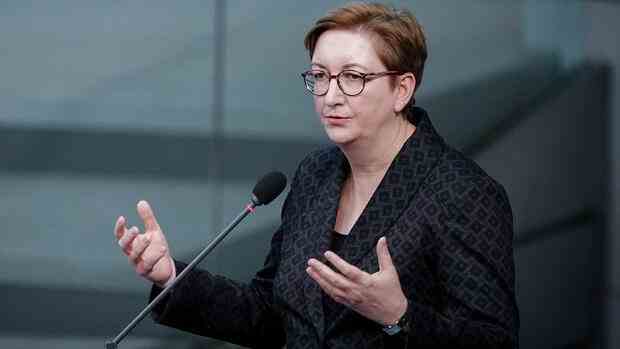Berlin Federal construction should become faster and more efficient. Procedures that used to last six to nine years – depending on the size of the construction project – are to be shortened to four to six years in the future.
This emerges from a draft law and a resolution recommended by the budget committee for the reform of federal construction, on the basis of which parliament passed the project on Thursday evening. “By bundling tasks, the procedures in federal construction should be accelerated overall, since a number of interfaces are eliminated and, in particular, an uninterrupted flow of planning and implementation is made possible,” it says. “The average project duration is expected to be reduced by about a third.”
A central component of the project is to give the Federal Agency for Real Estate Tasks (Bima) more autonomy and responsibility. Bima is one of the largest property owners in Germany. According to its own statements, it owns around 460,000 hectares of land and around 38,100 apartments. In addition, it manages almost all domestic official properties of the federal departments, around 4800 properties.
With the Federal Building Modernization Act, the Bima takes over the original responsibility for civil federal construction and thus replaces the Federal Ministry of Finance. However, the Ministry is responsible for the legal supervision of the authority.
Top jobs of the day
Find the best jobs now and
be notified by email.
The federal government is facing major tasks in federal construction: After all, the climate policy goals of the federal government must also apply to its own buildings and construction projects.
Bimah borrowing is still under review
The reform will make the Bima “more independent, modern, sustainable and therefore more future-proof,” said Green politician Hanna Steinmüller, member of the committee for housing, urban development, construction and municipalities, the Handelsblatt. The foundation stone is being laid so that the Bima can build twice as many apartments as before – namely 3,000 instead of 1,000 to 2,000, said Steinmüller. “Every apartment counts.” In addition, the bima would be given more financial design options and a significant increase in competence.
The question of whether the Bima itself can take out loans in the future, as provided for in the Ampel coalition agreement, is controversial. “That’s why we are now having the federal government examine in detail how the use of non-state financing instruments can be successful,” said Steinmüller. The government will report to Parliament by June 30 next year.
>> Also read here: Seven key trends homebuyers should know about
The Union supports the project. “The reform is right and necessary,” said CDU construction politician Jan-Marco Luczak to the Handelsblatt. “With the bima, the federal government can and should do justice to its role model function of improving the energy quality of buildings and also helping to meet the challenges of new housing construction itself,” he continued.
Opposition criticizes the fragmentation of responsibility
However, there is still one fly in the ointment: he would have liked “that the responsibilities had been concentrated under the umbrella of the Ministry of Construction,” says Luczak. The house of Federal Building Minister Klara Geywitz is already suffering from a lack of formal responsibilities, Luczak said. In fact, Geywitz pointed out several times in parliament on Wednesday that she was not responsible for the inventory of buildings, but the Federal Ministry of Economics.
Luczak takes a critical view of such a fragmentation of responsibility. “The construction minister lacks political clout, so now she’s practically prescribing a diet for herself. That’s hard to understand.”
>> Also read here: Minister of Construction: Will miss the mark of 400,000 apartments
However, legal supervision of the Federal Office for Building and Regional Planning (BBR) remains with the Ministry of Building. Like the Bima, the BBR should also become more independent. The BBR is responsible for buildings for the constitutional bodies and supreme federal authorities in Berlin, Bonn and abroad, as well as for cultural and research institutions.
Mechthild Heil, a member of the CDU Bundestag, criticized the fact that up to now there had been too little definition of how the desired reduction in the duration of the procedure by a third should actually be achieved. “In the future, it will become clear whether this has not been enough and whether further reforms will be necessary.”
More: One year traffic light coalition – That is the balance sheet of the most important ministers
